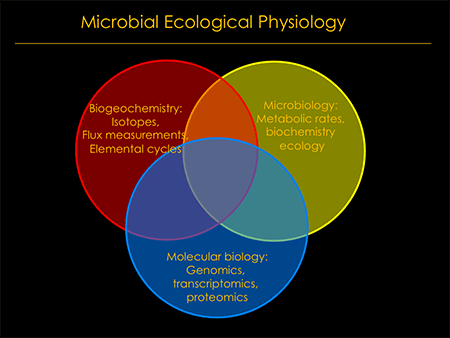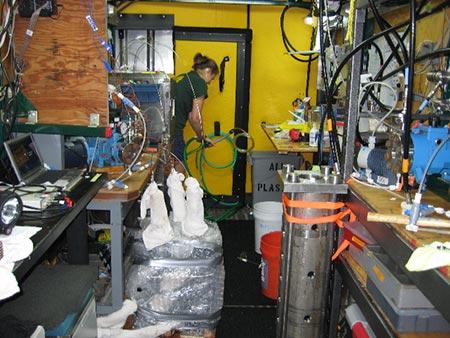Broadly speaking, ecological physiology aims to characterize the nature and extent of how organisms’ physiological mechanisms influence or govern ecological processes and interactions. The majority of our eco-physiological studies examine how deep sea microbes flourish and interact in chemically-reducing habitats such as hydrothermal vents and hydrocarbon seeps. In particular, we aim to better understand the physiological mechanisms underlying key metabolic processes, e.g. methane and sulfur oxidation. We are interested in understanding the bioenergetics of these processes, and the implications for growth, reproduction, survival, abundance, and — to a degree — the geographical distribution of microbes. We are most focused on understanding the interactions among microbes that mediate these processes, and their influence on local and broader biogeochemical cycles. We examine these communities in situ and ex situ experiments, and are often required to develop new techniques and tools to address questions of interest. Writ large, ecological physiology is aimed at understanding the continuum of interactions among organisms and their physical and chemical environment, and this requires expertise and appreciation of both ecological questions and biophysical, biochemical, and molecular methods and processes. Microbial ecological physiologists thus require a good understanding of both the molecular and cellular mechanisms underlying microbial metabolic processes, as well as the functioning of the microorganism in its environmental context.
Microbial Ecological Physiology
 Figure 1. Biological processes in every environment are intimately linked to the environment. Microbes in particular have an especially profound impact on the local geochemistry, and understanding the nature and extent of these interactions in by necessity an interdisciplinary venture.
Figure 1. Biological processes in every environment are intimately linked to the environment. Microbes in particular have an especially profound impact on the local geochemistry, and understanding the nature and extent of these interactions in by necessity an interdisciplinary venture.
 Figure 2. Our research interests drive us to develop approaches to studying live organisms (including microbial communities) in the field. Shown here is our 6 meter long mobile high pressure lab, in which we can maintain organisms and communities at environmentally relevant conditions while at sea or on land.
Figure 2. Our research interests drive us to develop approaches to studying live organisms (including microbial communities) in the field. Shown here is our 6 meter long mobile high pressure lab, in which we can maintain organisms and communities at environmentally relevant conditions while at sea or on land.
